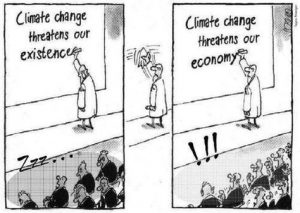Archive for category Global
Sounding the Alarm
Posted by Jonathan Cloud in Carbon Pollution, Climate Change, Economy, Editorial, Energy & Environment, Finances, Global, National, Policy, Politics, Sea Level Rise on Sunday, January 6, 2019
New observations show that climate change is already harming us in a wide variety of ways. Possible Planet is looking at what we can do about it, from rewarding carbon capture on a global scale to refreezing the Arctic.
Mounting Evidence of Harm to Humanity and the Biosphere
Climate change—or, as Dr. Janice Kirsh prefers to call it, climate disruption1—is already upon us. The effects are real, costly, and increasingly measurable. Amongst several other dire warnings issued near the end of 2018, the latest report of the Lancet Countdown notes that “Vulnerability to extremes of heat has steadily risen since 1990 in every region, with 157 million more people exposed to heatwave events in 2017, compared with 2000,” and “153 billion hours of labour were lost in 2017 because of heat, an increase of more than 62 billion hours since 2000.” Moreover,
The direct effects of climate change extend beyond heat to include extremes of weather. In 2017, a total of 712 extreme weather events resulted in US$326 billion in economic losses, almost triple the total losses of 2016.2
Add to this the “excess costs” of rising sea levels, and rising levels of ocean acidity; the agricultural impacts and the spread of vector-borne and water-borne diseases; and the broad range of public health impacts—and it’s clear that today’s costs and consequences alone are reason enough to sound the alarm.
But the planet also faces other imminent disasters:
- the loss of natural habitat and biodiversity, precipitating what is widely considered “the sixth mass extinction event”
- the widespread loss of soil fertility threatening agricultural production
- and wars, conflicts, and mass migrations that are already being precipitated by environmental changes
 Though some people are still apparently unwilling to believe that climate change is real, or that humans are the major cause of it, these very real economic and biophysical costs are of increasing concern to global policymakers, public health professionals, the insurance industry, and even the military. And ironically it’s perhaps the risk to the economy, even more than to the biosphere, that will drive a meaningful response.
Though some people are still apparently unwilling to believe that climate change is real, or that humans are the major cause of it, these very real economic and biophysical costs are of increasing concern to global policymakers, public health professionals, the insurance industry, and even the military. And ironically it’s perhaps the risk to the economy, even more than to the biosphere, that will drive a meaningful response.
Global Climate Deal and the Missing Link
Posted by Jonathan Cloud in Carbon Pollution, Climate Change, Energy & Environment, Global, Policy on Saturday, January 24, 2015
The climate deal fleshed out in Lima, Peru, is that all countries can set their own climate goals [1,2,3]. But will this be effective in preventing dangerous greenhouse gas emissions? Very unlikely, writes Delton Chen (Geo-Hydrologist, Civil Engineer):
 During the past 250 years of industrial and technological revolution, the primary catalyst for innovation and the fundamental driver of economic growth has been the availability of fossil fuels (i.e. coal, oil and gas). To avoid extremely dangerous climate change, the global economic system must be re-organised at a fundamental level, and the new order must include a social transformation that grows exponentially; otherwise the required mitigation of greenhouse gas (GHG) emissions will be too slow to avoid a climate catastrophe.
During the past 250 years of industrial and technological revolution, the primary catalyst for innovation and the fundamental driver of economic growth has been the availability of fossil fuels (i.e. coal, oil and gas). To avoid extremely dangerous climate change, the global economic system must be re-organised at a fundamental level, and the new order must include a social transformation that grows exponentially; otherwise the required mitigation of greenhouse gas (GHG) emissions will be too slow to avoid a climate catastrophe.
The United Nations Framework Convention on Climate Change (UNFCCC) was put into effect in 1994, and civilisation officially acknowledged that it was ‘addicted’ to fossil fuels. The ultimate aim of the UNFCCC is to prevent “…dangerous human interference with the climate system”[4]. The recent UNFCCC’s meeting in Lima, Peru, provides the latest update on civilisation’s de-carbonisation program, but the results of the Lima meeting signify global action will be further delayed given that nations are only obliged to make voluntary commitments.
Jigar Shah’s Creating Climate Wealth (2013)
Posted by Jonathan Cloud in Energy & Environment, Global, National, News, Review, Sustainability, Sustainable Business on Saturday, January 4, 2014
 Jigar Shah has a disarmingly powerful message for today’s young capitalists: fixing the climate crisis is the biggest financial opportunity of our lifetimes. Indeed, Shah is on track to become a role model for a new generation of entrepreneurs who are committed to leveraging mainstream investment for social transformation.
Jigar Shah has a disarmingly powerful message for today’s young capitalists: fixing the climate crisis is the biggest financial opportunity of our lifetimes. Indeed, Shah is on track to become a role model for a new generation of entrepreneurs who are committed to leveraging mainstream investment for social transformation.
In Creating Climate Wealth, Shah makes the case that clean energy represents a ten trillion dollar investment opportunity—if we are just willing to look at what already makes economic sense in addressing the impacts of climate change. The premise of his book, as he states it in a recent video interview, is that 50% of the climate challenge can be tackled profitably with existing technologies, if we have the right business models.
Beyond Lingering Problems in Haiti, Progress and Vision Spark Hope
Posted by Jonathan Cloud in Haiti on Friday, March 4, 2011
Sustainable Haiti Conference, April 4-6, Miami Convention Center to Feature Sustainable Haiti Coalition
n the face of cholera outbreaks, political turmoil and faltering development efforts in Haiti, can individuals in America impact the long-term prospects for Haitians? Tamara Apollon, president of Mon Pays Mon Cuisine (i.e. My Country, My Cuisine) (Piscataway, NJ), told a United Nations commission on the status of women on February 22 that more help is needed.
She for one is doing her part. In the past several years, Apollon has traveled to Cuba and Spain, and is also meeting with companies in the U.S., to open new markets for novel Haitian-based products such as mango juice, squash puree and dried fruits. The products support a community cooperative of 300 women fruit growers in Lascoabas, about 90 minutes from Port au Prince. Apollon can generate demand for the products, but further investment is needed to buy generators, processing and storage equipment to bring the cooperative to its full potential, she says.
Toward a Sustainable Future for Haiti
Posted by Jonathan Cloud in Analysis, Editorial, Global, Haiti, Sustainability on Monday, February 8, 2010
 The earthquake in Haiti has been many things – including both a wakeup call for Americans, and an opportunity to demonstrate our compassion – but it has above all been a human tragedy that has revealed the weaknesses and deficiencies that were there before. A 7.5 magnitude earthquake will no doubt cause some damage no matter where it occurs, but it does not always need to cause the extent of devastation that has occurred in Haiti, or to leave the population as unaided.
The earthquake in Haiti has been many things – including both a wakeup call for Americans, and an opportunity to demonstrate our compassion – but it has above all been a human tragedy that has revealed the weaknesses and deficiencies that were there before. A 7.5 magnitude earthquake will no doubt cause some damage no matter where it occurs, but it does not always need to cause the extent of devastation that has occurred in Haiti, or to leave the population as unaided.
Some colleagues of ours at the Institute for Sustainable Enterprise met last week to discuss what we could do to contribute to a longer-term recovery, that would try to address the social, environmental, and economic challenges facing this troubled nation. We talked about a great many things, including the fact that many of us feel powerless in the face of such catastrophes, especially those that afflict human beings in distant places. We are all “overcommitted” to many worthwhile and challenging tasks already, and taking on such a monumental task as helping to chart the way forward in Haiti clearly seems to require that we steal time and energy from other causes. But if we can make even a small difference, while honoring our other commitments, this seems a compelling goal. Read the rest of this entry »
An Open Letter to the President
Posted by Jonathan Cloud in Analysis, Editorial, Global, National on Tuesday, January 26, 2010
The Road Not Taken:
A Letter to President Obama
from a Concerned Democrat,
and a Concerned Citizen
Dear Mr. President:
I write out of deep concern as to the state of our nation today.
I believe that in the year since your inauguration, an important opportunity has been missed to unify and mobilize the American people in the service of their highest ideals.
I acknowledge the many pressures and challenges that have been thrust upon you by circumstances, and I applaud you for the intelligent and courageous actions you have taken. Your actions have, as almost all economists now recognize, averted an outright collapse of the financial system. And this is but one of many remarkable accomplishments, not the least of which has been changing the tone around America’s role in the world. Read the rest of this entry »
Will Cap and Trade Work?
Posted by Jonathan Cloud in Analysis, Global, National, State on Thursday, December 31, 2009
 A couple of years ago I suggested to Frank Felder, Director of Rutgers’ Center for Energy, Environmental, and Economic Policy (CEEEP), that we co-sponsor a debate on the relative merits of cap-and-trade vs. a carbon tax. The idea went nowhere, because the conventional wisdom, then as now, is that anything with the word “tax” in it is a political nonstarter.
A couple of years ago I suggested to Frank Felder, Director of Rutgers’ Center for Energy, Environmental, and Economic Policy (CEEEP), that we co-sponsor a debate on the relative merits of cap-and-trade vs. a carbon tax. The idea went nowhere, because the conventional wisdom, then as now, is that anything with the word “tax” in it is a political nonstarter.
I thought this was shortsighted then, and think it is still short-sighted now. If we fail to discuss what may be better alternatives because they are not politically popular, they will never get the chance to become widely considered, and we will have allowed a self-fulfilling prophecy to dictate our fate. Political acceptability is an important factor in choosing a course of action. But it is not the only one. If a carbon tax (or, as some prefer to call it, a “fee”) is a better approach, then we need to figure out how to make it palatable. And if cap-and-trade will, as others claim, do more harm than good, then we need to consider how to de-legitimize it. Read the rest of this entry »


Recent Comments